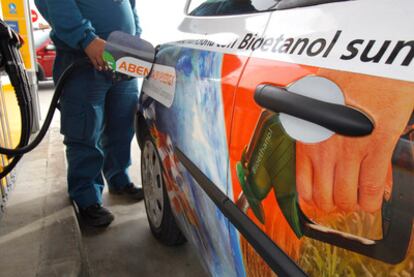Gallardón will take five years to bring Madrid's pollution in line with law
The mayor plans a local network of refueling points for green vehicles
During a two-week period in which air pollution in Madrid reached dangerously high levels, citizens had no choice but to pray for rain. On Sunday, wind and showers finally rid the city skyline of its brown shroud of toxic particles, but it left questions hanging over City Hall officials.
Such as, why has Madrid broken EU air pollution levels for the last decade? And, when was the city planning to take action to reduce traffic, which causes 80 percent of Madrid's smog?
Mayor Alberto Ruiz-Gallardón gave some answers to these questions on Monday, the day that acceptable air quality returned to Madrid thanks to the reappearance of wintry weather. He said that the Spanish capital's levels of toxic gas Nitrogen Dioxide (NO2) will be brought back in line with European legal safety levels within five years. "I am convinced that before these five years are up, we will have complied," he said.
Gallardón says limits or levies on traffic would harm the city's economy and jobs
Asthma sufferers and those with allergies who were worst hit by this month's air pollution spike may be interested to hear that Gallardón will not put the brakes on the 2.5 million weekly car journeys that are made into the city, nor will he introduce a congestion charge. Instead, the Popular Party mayor has unveiled a plan for a local network of refueling centers for vehicles that run on alternative power, such as natural gas, liquid gas or bioethanol.
By 2011, Madrid is meant to have 31 such stations, in addition to 280 recharging stations for electric cars. But the planned installations beg another question: who will use them? There are only 2,000-3,000 electric cars in the whole of Spain.
With local elections just three months away, the Popular Party's (PP) Gallardón is not prepared to cut traffic, a measure he says will hurt the economy and destroy jobs. He has highlighted other efforts by City Hall, such as renewing its own fleet of vehicles with less-polluting models, building 200 kilometers of subway lines and pedestrianizing some inner-city streets. He claims that these measures have meant that Madrid has better air quality today than 10 years ago.
However, campaigners Ecologists in Action point to other factors for the technical registration of improved air quality: the removal of pollution monitors to cleaner parts of the city, several years with higher-than-usual rainfall, and an eight-percent drop in fuel use in 2010 due to the crisis. And despite all that, Madrid still broke legal levels set by the EU in 2001 every year for the last decade. The organization has filed a suit against Gallardón and City Hall environment chief Ana Botella for "crimes against the environment and human health."
On January 19, City Hall officials acknowledged pollution levels were illegal, after the annual average of NO2, a respiratory irritant produced mainly by motor vehicles, was found to be 44 micrograms per cubic meter, in contravention of the 40mg EU limit. Yet officials still deny that Madrid has a problem. Environment chief Botella said last week that "unemployment suffocates more than the air."
"Until we reach 400 micrograms of NO2, there will be no alert. It would be very difficult for there to be an alert in this city," she told the conservative daily Abc . On this point Ecologists in Action are in full agreement with Botella, the wife of former PP Prime Minister José María Aznar. Spokesman Paco Segura says Madrid has set the levels for an alert in such as way that all pollution stations must register dangerous levels at the same time - including those in parks and green spaces - something he says is technically impossible.

Tu suscripción se está usando en otro dispositivo
¿Quieres añadir otro usuario a tu suscripción?
Si continúas leyendo en este dispositivo, no se podrá leer en el otro.
FlechaTu suscripción se está usando en otro dispositivo y solo puedes acceder a EL PAÍS desde un dispositivo a la vez.
Si quieres compartir tu cuenta, cambia tu suscripción a la modalidad Premium, así podrás añadir otro usuario. Cada uno accederá con su propia cuenta de email, lo que os permitirá personalizar vuestra experiencia en EL PAÍS.
¿Tienes una suscripción de empresa? Accede aquí para contratar más cuentas.
En el caso de no saber quién está usando tu cuenta, te recomendamos cambiar tu contraseña aquí.
Si decides continuar compartiendo tu cuenta, este mensaje se mostrará en tu dispositivo y en el de la otra persona que está usando tu cuenta de forma indefinida, afectando a tu experiencia de lectura. Puedes consultar aquí los términos y condiciones de la suscripción digital.








































